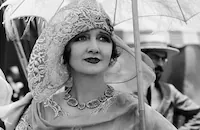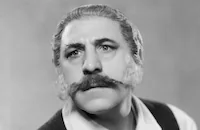A Tailor Made Man
Cast & Crew
Sam Wood
William Haines
Dorothy Jordan
Joseph Cawthorn
Marjorie Rambeau
William Austin
Film Details
Technical Specs

Synopsis
In New York, presser John Paul Bart works at Theodore Huber's tailor shop, but dreams of rubbing elbows with the people whose expensive clothes he presses. Not known for his diligence or hard work, the snobbish John would rather keep abreast of local society news than toil in Huber's shop. One day, while pressing a suit for customer Theodore Jellicott, John learns that the suit will be worn to a ritzy party at the home of the wealthy Stanlaws, where Jellicott expects to meet Abraham Nathan, head of the Nathan Company, in the hope that the gentleman will remember that he saved his life many years earlier. John immediately realizes that by wearing Jellicott's suit he can get into the Stanlaw party, so he decides to impersonate Jellicott and curry Nathan's favor himself. At the party, John becomes an instant hit with the wealthy guests and convinces Nathan that it was he who saved his life. When the befuddled Jellicott arrives he fails to recognize his own suit on John. After engaging Nathan in a conversation about the economy, John and he become fast friends, and Nathan offers John a job at his company. Later, John returns to the shop and tells Huber's daughter Tanya that he has been hired by Nathan. Although Tanya is engaged to Dr. Gustav Von Sonntag, an intellectual, she and John are secret lovers. When Huber discovers John in Jellicott's suit, he concludes that he is either a gentleman thief or a gangster, and fires him. Soon after starting at the Nathan Company, John learns that the business is going under, and decides to take matters into his own hands. Unknown to Nathan, John calls an employee meeting, in which he gives a speech designed to restore optimism and pride in the company. Nathan and his board of directors listen nervously as John introduces his "Nathan Plan" and turns the crowd of angry employees into cheering workers by guaranteeing their jobs and promising raises. John does not win the support of Nathan and the board of directors, however, and he loses his job. Tanya visits John to show her support for him, but Sonntag follows her and tells John that he will expose him as a fraud. As a result, John makes a public confession and returns to Huber's to take his place at the pressing machine. When Nathan shows up at Huber's to tell John that his "Nathan Plan" saved his company from disaster, and that he will be hired back at twice his original salary, Huber changes his opinion John and allows his daughter to marry him.

Director

Sam Wood
Cast

William Haines

Dorothy Jordan

Joseph Cawthorn

Marjorie Rambeau
William Austin

Ian Keith

Hedda Hopper

Hale Hamilton

Henry Armetta

Walter Walker
Forrester Harvey

Joan Marsh
Martha Sleeper
Crew

Film Details
Technical Specs

Quotes
Trivia
Notes
An English language version of Gábor Drégely's play, entitled A Tailor-Made Man, opened in New York on August 27, 1917. A January 1931 Motion Picture Herald news item refers to this film as The Imposter. Another version of the play, filmed by United Artists in 1922, was directed by Joseph De Grasse and starred Charles Ray and Thomas Ricketts (see AFI Catalog of Feature Films, 1921-30; F2.5515).












